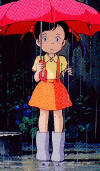|

|
RETROSPECTIVE
Tonari no
Totoro (My Neighbor Totoro)
Starring: Hitoshi Takagi,
Noriko Hidaka,
Chika Sakamoto,
Shigesato Itoi,
Sumi Shimamoto
Directed By: Hayao Myazaki
Produced By: Yasuyoshi Tokuma
Written By: Hayao Myazaki
Distributed By: Studio Ghibli |
Hayao Myazaki is one of the most mystically amazing animators in
the history of film. His best film, Tonari no Totoro (English
title: My Neighbor Totoro), is a superior achievement. It is my
favorite animated feature of all time, as well as my third favorite film
ever. My Neighbor Totoro, like all Myazaki creations, escapes the
formalities and clichés of the animated genre. This is what makes this
Japanese filmmaker so bold. He captures real emotion and feeling in his
works, even though they are primarily intended for children. I was moved
by My Neighbor Totoro, and have seen it over fifty times, since
my younger years. Back then, I saw it as unbelievable entertainment.
Now, I respect it as animation’s finest. Myazaki is even considered the
world’s best animator by the artists who work for Disney. My Neighbor
Totoro is a colorfully enchanting exhibition of his most visionary
work. He is an inspiring creator of beautiful anime.
Rolling along the dirt road, amidst conflicting feelings, Satsuki’s
family plods along in their truck, destined to find their new home.
Well, actually, not her whole family. Her mother is sick, and in the
hospital. She might be able to come see them and their new house
sometime soon. She, Mei, and their father will have to try to live life
as best they can in their new home, without their mother. As they pull
up to the vacant, old dwelling, in the middle of the forest, a sigh
emerges amongst all of their faces. When will mommy get well again? When
will she be able to come home? But, happiness is still in their
presence, apparently. The girls run around, and life moves on. Each
member of the family needs each other, especially with the fourth person
absent. They are in for a surprise that will need them to be happy. They
will have to be happy. There is no other option. A Totoro doesn’t like
sadness, nor does it like sad people. A Totoro’s world is a happy,
serene place.
And I’ll leave it at that. Why should I give anything more away
when you can experience the goodness of Myazaki for yourself? My
Neighbor Totoro is an outstanding film, lavishly highlighted by a
certain beautiful liveliness, captured though the simple beauty of the
atmosphere. This is both a film that will make you appreciate life, as
well as one that will make you appreciate it itself. It expresses an
optimistic look on peace through its beautiful skill in the art of
filmmaking. But, the peaceful attitude of the picture is not shown
through simple hearts and stars. It is conceived through hardship. Real
problems. In a Disney movie, reality doesn’t exist. Myazaki’s films are
actually very close to reality, even though he irresistibly creates
magically fictional elements in each frame of them. His movies show true
personality. They are not just pieces of trash, which will only satisfy
the low expectations of children. No. They are far from it. His films
are a delight—for kids, and anyone of any age, for that matter. My
Neighbor Totoro is a mystical representation of this; an animated
tapestry of greatness.
All of Myazaki’s films are hand-drawn, and he has just begun to use
small bits of computer animation in his works. This is, in a way,
comforting. It is nice to see one, who relies on old techniques. In a
society consumed by Pixar and 20th Century Fox, all of which
primarily use only computers to make their animated films, it is always
interesting to see a man, who relies on the roots that build the art of
animation. Myazaki, himself, draws thousands of the frames that make up
his movies. This is inspiring. Japanese anime, in itself, is
motivational. There is true intricacy and profoundness in each scene.
This is a genre that realizes the problems that we face in real life,
probably even more so than some of the big-budget dramas that are
released these days. I have tremendous respect for all filmmakers in
this elegant field of beauty, particularly Myazaki and his fellow
animator, Rintaro. My Neighbor Totoro just goes to show us how
wonderful anime can be, and how perfect the simplicity of it is. The
wonders of the Japanese culture are expressed in each film of the genre,
and this is what makes most of it so miraculously stunning.
The subtitled version and the dubbed version appear to be
completely different films, though I like both of them. While I do
prefer the original, native work, the American voice talents did an
excellent job in dubbing My Neighbor Totoro. The biggest contrast
in the two versions is the interpretations of Mei. In Japanese, Mei is a
frantic and loud child. Her personality is shows through in the same way
in English, but in a less dramatic way. Mei’s quietness and mutterings
in the dubbed version help show us the cleverness of Myazaki’s
animation. He uses many facial expressions and body language in his
films, to help us better understand them. If My Neighbor Totoro
was a silent film, we would be able to understand it completely. The
magic is in the animation, not the words coming out of each of the
characters mouths. I watch My Neighbor Totoro time, after time,
and never get tired of it. There is always something new to admire.
In its intrepid excellence, My Neighbor Totoro is easily one
of the best films of all time. Myazaki is the best animator, still
living today. This is a film that’s as visionary and creative as a
dream. Wonderful. Simply wonderful.
-Danny Baldwin, Bucket Reviews